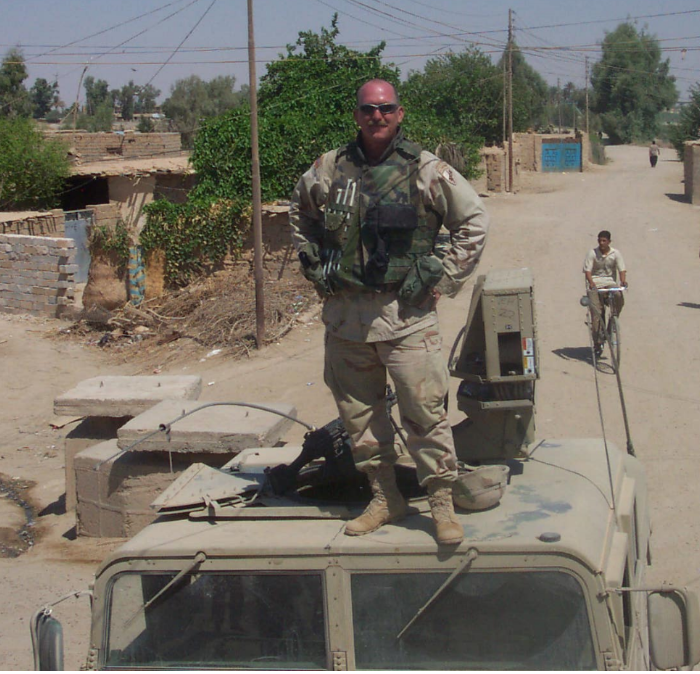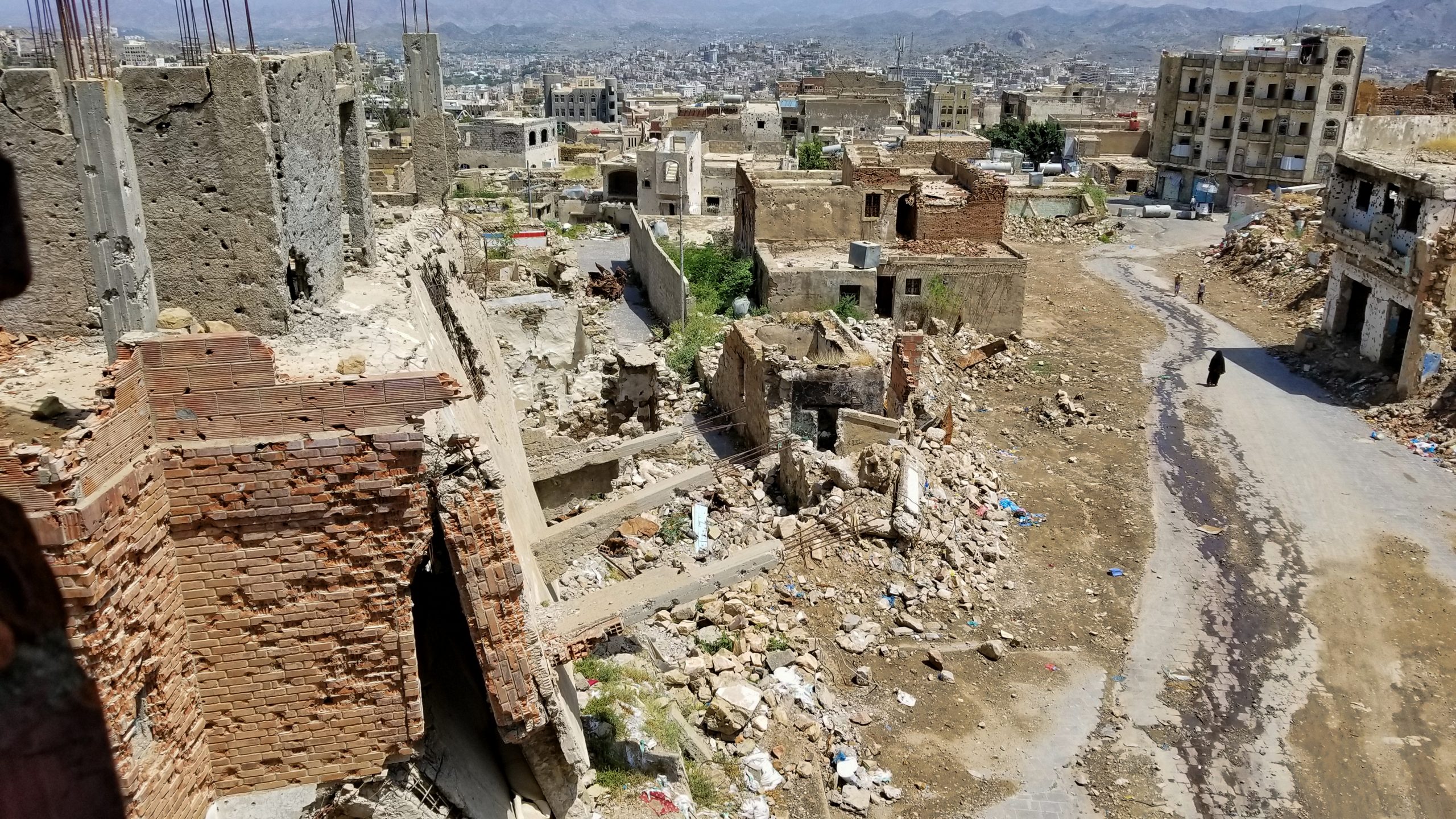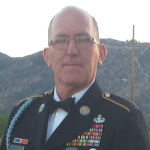The Crying Woman with The Blind Mother – An Iraq Story –How a Small Act of Compassion Restored My Humanity
This is an article from the Winter 2020/21 issue of Combat Stress
By Tom McMurtry, DAIS, Police Officer (RET), CPT, US Army, Special Forces (RET)
Binary Thinkers
Soldiers and police officers tend to view the world in binary terms. I know because I’ve been both. We’re at war or we’re at peace. A suspect is under arrest or they are free to go. Shoot or don’t shoot. This all-or-nothing way of thinking and training exists within these professions because it simplifies the life and death decision-making process. Many decisions of lesser importance follow the same pattern of training and reacting. Rules of engagement are created to clearly list those behaviors that will be tolerated and behaviors that will not. This allows groups of Soldiers and police officers to move and to work as a unit without individual instructions. Subtlety, nuance, and individuality were not taught at the Infantry School, nor in my police academy.

Hold the Perimeter
My story begins on a hot day in the summer of 2003. I was in the western Iraqi desert, serving as the leader of the Tactical Psychological Operations Team attached to the 3rd Armored Cavalry Regiment. My team had a loudspeaker mounted on top of our HMMWV truck. This was used for surrender appeals, crowd control, or anything else that the cavalry might need to tell the Iraqis. The 3rd ACR had been given a search and seizure mission on a large family compound near the town of Habbaniya. This was going to be a daylight raid, so visibility would be better, but there was still an increased risk that our presence would draw a crowd. The approach went well. The compound was quickly surrounded and all the adults inside did what our loudspeaker broadcasts told them to do. Most of the raiding party started searching the compound and interviewing the adult men. A smaller group of us were given the task of holding the outer perimeter. Our orders were simple. Nobody gets in and nobody gets out.
“I am the Oldest Daughter!”
The perimeter was established using tracked vehicles, young men with rifles, and yellow plastic tape. I positioned the loudspeaker truck and myself where the perimeter crossed the main road in the village. A crowd had already started to gather there. I had the loudspeaker broadcast a standard “stay back” message. A middle-aged woman worked her way into the front. She started shouting and waving, trying to get my attention. I ignored her, avoiding eye contact behind my dark sunglasses; but she would not be deterred. She recruited some of the men around her to join in trying to get my attention. This worked. I approached her and between my limited Iraqi and her much better English, I came to understand that she was the oldest daughter of the man who owned the compound and that her mother was inside and was blind. I acknowledged this but told her that she would still have to wait until the search was over. This caused her great distress and she was crying as I walked away.

This situation was common enough with crowd control in Iraq. Someone would come forward and explain that the rules didn’t apply to them because of who they were, yet she was not like the others. She was not trying to cross the line because of her wealth or social status. If she was to be believed, she just wanted to be with her blind mother, who was probably terrified. Also, being the oldest daughter meant she was almost certainly the one who had the primary responsibility for caring for her mother and the other women of the household. I thought about this and felt bad for her. Maybe I could ask permission to let her in. At this point in the war, Soldiers did not have individual radios. Only vehicles had radios. I looked back toward the compound to see if there was someone I could talk to, but there was not.
This oldest daughter was apparently a woman of importance because she started giving orders to the men of the village. In a few minutes, an Iraqi man in a white shirt and tie came to the front and called to me in perfect English, with a British accent. I went out to talk to him and the crowd pressed forward to hear. The man introduced himself and explained that this woman was the oldest daughter of the man who owned the compound and that her mother was blind and that therefore, she must be allowed in. I could feel the tension in the crowd of perhaps 200 people. I needed to say no in such a way that I would not be asked again. I needed to use my command presence and a firm adult voice to convey my unwavering determination. Anything less and the crowd could turn ugly. I had been trained for moments just like this and was ready. Still, I hesitated.
Maybe I could let in just this one person, just this one time. There would not be any real security breach if I walked this woman through the perimeter into the compound. The war effort would not suffer any real harm. The crowd would probably relax. I felt real compassion for this crying woman, who just wanted to be with her mother. I looked over my shoulder toward the compound again. No help. This was going to be all on me. I made my decision.
I took off my sunglasses, stepped forward, and tried to look surprised. “Oh,” I said. “She is the oldest daughter?” I spoke as if I had not understood before. “It is her mother who is blind?” Turning to the woman who was now looking relieved, I said. “Please tell her I am sorry. I had not understood. Of course, she can come in. I will escort her myself.” The man with the British accent began translating my words into Iraqi, but those who understood English were already reacting in a positive way. When he was done, there were cheers. I turned to find my fellow perimeter guards looking on with great interest. In a loud voice, I said “Sergeant Brown, you have the perimeter. I’m walking one in.” I waited until Sergeant Brown acknowledged me and positioned himself in the center. Then I lifted the yellow tape and gestured for the woman to follow me.
A Gun, Under Your Dress?
It was perhaps a twenty-five-yard walk to the main gate of the compound. As I walked away from the protective weapons and men on the perimeter, I realized I could be in big trouble. Was this woman a suicide bomber? Things like that had happened. Did she have a gun under her dress? That very thing had happened to me before. I had found an AK-47 with a loaded 30 round magazine under the long flowing dress of a woman in a house we were searching a few weeks earlier. It was a very tense moment. The woman with the gun under her dress had not been searched. She could have killed me or any of the Americans at the cost of her own life. Her husband realized she was hiding his rifle and told her to turn it over to us. Everybody survived that night.
With that incident in mind, I clearly could not just walk this woman in without ensuring the safety of the Americans. She had to be searched. I also could not search her in view of the crowd. Americans touching Iraqi women for any reason tended to send Iraqi men into a fury, as though we had just killed one of their own. The American Soldier that had been at the front gate was no longer there, so we just walked on in. I immediately looked for someplace to conduct the body search. I saw a small room on the side and motioned toward it. This was the home of the woman I was escorting, and she indicated that this was the wrong direction and began to step away. I firmly indicated that she was to go into the small room.
American Soldiers in full battle gear can be a scary-looking bunch. She looked at me with real fear for the first time. I realized that she probably thought that this was where she would be sexually assaulted by me and other Soldiers, yet she went where I told her. Once inside, I tried to explain that I had to search her before we could go any further. She did not understand the words I was using, so I asked her “Gun?” pointing at the assault rifle I was carrying. “Under your dress?” pointing at what she was wearing. She understood and with a look of humiliation and pain began to lift her dress. “No, no,” I said, with a downward motion of my hand. “Just hold still.” I walked behind her and quickly pulled her loose clothing tight. If she was carrying anything that would hurt me, it would show. It only took a minute and she was safe. “Okay. Let’s go.” I said, with my hand pointing to the way out of this small room. She looked surprised and relieved as she walked out and headed toward the open courtyard in the middle of the compound. There were American guards there watching over a group of women and children. I didn’t want to try to explain why I was there, so as we approached, I called to the nearest guard and simply said, “One more.” He looked resigned and gave a head nod toward the group he was guarding.
It was almost over. I indicated to the oldest daughter that she was free to join the others. She had not yet been seen and when she stepped into the courtyard, there were cries of joy. The blind mother held out her arms to the open air until her oldest daughter filled them. The whole group of perhaps 20 women and children were all laughing and crying and talking at the same time. The guard looked at me as though this was both unhelpful and clearly my fault. It was time for me to go. I gave a shrug and a nod, and I headed out of the compound and back to my place on the perimeter.
Within an hour or so, we were packing up and rolling out. The raid was a marginal success and ended without incident. Once back at the staging area, there was a mandatory after-action review. I waited anxiously to be asked why I let someone through the perimeter. I was prepared to explain my actions in strictly tactical military terms. The woman was harmless and letting her in quieted the crowd. But the question never came. Although my prepared response was true, the real reason I broke the rules for the crying woman with the blind mother was that I felt compassion for her. It had been a while since I had felt that emotion.
Restoring My Humanity
Back home before the war, it was easy to be compassionate, sympathetic, and generous to others. Then my reserve unit was activated for the invasion of Iraq and I transformed into a hard and stoic Soldier. There were enemies to be found and neutralized. The Iraqi civilians were in the way and were treated as such. When the shooting war was over, my unit’s deployment was extended to become part of the hard pivot into an occupation. Suddenly instead of warfighters, we were peacekeepers and nation builders. Unfortunately, the American Soldier at that time was neither trained nor equipped to do either. All we had were war-fighting tools and warfighting skills. These often did not serve us well while working with groups of confused and angry Iraqi civilians. I worked hard to ensure that my Soldiers maintained their professional demeanor; being neither kind nor cruel, being understanding, but not sympathetic. Unsurprisingly, there were times when I knew we were not behaving like the good guys. As weeks turned into months, I could tell that my cold-hearted behavior was taking a toll on my humanity. Our work was once described as herding sheep while watching for wolves. Neither group was perceived as human.
At the time of the raid described above, it was a hundred days into the occupation and nothing seemed to have improved. Then I met the crying woman with the blind mother and this time I saw her as a fellow human being under great distress. She had done nothing to bring this on herself. The raid was not her fault. The war was not her fault. The situation was also not my fault but there we were looking at each other across the yellow tape. Her pain was raw and real and I could help. So, I lifted the tape and walked her to her mother. It was not a big deal in the overall war effort, yet that small act of compassion briefly restored my humanity. I thought back on it for days. I still faced more than two hundred days in Iraq before my unit would rotate home, but the insight I gained that day carried me through the tough days that remained. If the situation permitted it, I would allow myself to feel and show the emotions I was experiencing. This in turn, and in a way, I can’t fully explain, caused me to feel much less overall stress, even in a combat zone. The challenge is in fighting back against the ugliness of war so as not to lose sight of what makes and keeps us human when the day is done.
ABOUT THE AUTHOR 
Tom McMurtry, DAIS, Police Officer (RET), CPT, US Army, Special Forces (RET) has spent most of his adult life serving others. He joined the US Army at the age of nineteen, volunteered for and completed Infantry, Airborne, and Special Forces training. After three years serving on a Special Forces HALO Team Tom became a Reservist. He remained in the Special Operations Reserve for twenty more years. He was recalled to active duty for the invasion of Iraq as a
Psychological Operations Specialist, during which he was awarded the Bronze Star Medal. After his combat tour, Tom returned home and entered the police
academy at age 49. He served as a patrol officer for 15 years and received the Distinguished Action Award for his response on the night of the Dayton mass
shooting in the Oregon District. Tom retired at the age of 65 but was recalled to part-time duty by his department at the height of the pandemic to help cover
for fellow officers who were sick. All of that aside, Tom will tell you that he takes the greatest pride in his 45-year marriage to my wife, Holly, along with our five
children and ten grandchildren.
Combat Stress Magazine
Combat Stress magazine is written with our military Service Members, Veterans, first responders, and their families in mind. We want all of our members and guests to find contentment in their lives by learning about stress management and finding what works best for each of them. Stress is unavoidable and comes in many shapes and sizes. It can even be considered a part of who we are. Being in a state of peaceful happiness may seem like a lofty goal but harnessing your stress in a positive way makes it obtainable. Serving in the military or being a police officer, firefighter or paramedic brings unique challenges and some extraordinarily bad days. The American Institute of Stress is dedicated to helping you, our Heroes and their families, cope with and heal your mind and body from the stress associated with your careers and sacrifices.

Leave A Comment
You must be logged in to post a comment.